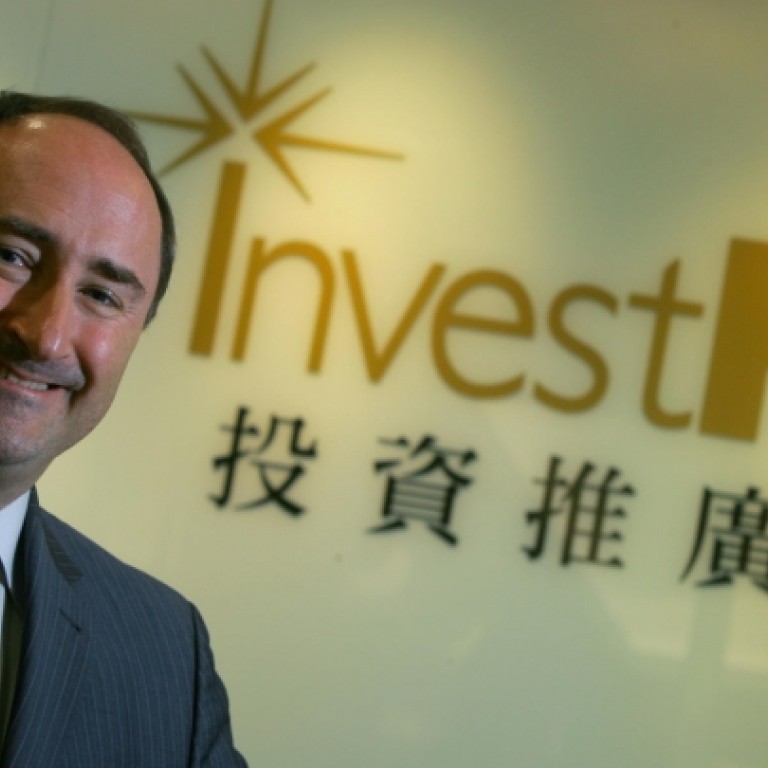
InvestHK goes with the flow instead of chest-thumping
In previous years this has been an exercise for immense chest-thumping on the part of InvestHK, as if it was responsible in some way for the billions of dollars that flowed through the city. Although Hong Kong attracted some US$75 billion in FDI last year, InvestHK's presentation appears to have been more muted this year.
InvestHK yesterday unveiled figures for Hong Kong's foreign direct investment flows as compiled by the UN Conference on Trade and Development.
In previous years this has been an exercise for immense chest-thumping on the part of InvestHK, as if it was responsible in some way for the billions of dollars that flowed through the city. Although Hong Kong attracted some US$75 billion in FDI last year, InvestHK's presentation appears to have been more muted this year.
We well remember Wong Tak-jun, dean of the faculty of business administration at Chinese University who is always wheeled out for these events, sagely telling the assembled two years ago that: "The way we calculate these funds is that they really have to be invested here." Right, all US$68.9 billion of it - the amount two years ago. The equivalent, say, of building 26 combined IFC and Two IFC complexes. However, InvestHK's attitude to these funds appears to have changed this year. No longer is there an attempt to maintain the pretence that these funds remain in Hong Kong.
Indeed Invest HK's director-general Simon Galpin said in a press statement that Hong Kong remained a "significant conduit" for both inbound and outbound investment. Perhaps the penny has at last dropped that most of these funds involve round tripping in and out of the mainland, in addition to sizeable money-laundering proceeds. All of which we're told contribute to Hong Kong's business-friendly environment.
We see that investment bank Jefferies Hong Kong recently received a big poke in the eye courtesy of High Court deputy judge Conrad Seagroatt, who found that the firm had wrongfully dismissed its former Asia head of equity trading, Grant Williams. Williams edited a daily newsletter called " Things that make you go, Hmm ...", aimed at "pushing the boundaries of edginess", and amusing the bank's clients. Jefferies had set up an elaborate structure for it to be vetted in London and New York. Interestingly, one edit involved changing a reference to the North Korean leader from "North Korean Dictator" to "North Korean Head of State".
One day, when Williams asked someone else to handle the newsletter because he was travelling, somebody erred and pressed the distribution button before it was vetted. The company hierarchy panicked, according to Mr Justice Seagroatt, because it contained a link to a video clip of a parody of Adolf Hitler in the 2004 film . The parody also touched on a conspiracy theory alleging JP Morgan was manipulating the price of silver. Jefferies' reaction, according to the judge, was "verging on the absurd" and "palpably unfair", "hypersensitive" and irrational.
Williams was sacked in December 2010 for "gross misconduct" within 20 hours and 44 minutes of the newsletter going out, following a two-minute meeting with Michael Alexander, CEO of Jefferies Asia.
In his judgment, Mr Justice Seagroatt said the reason for the dismissal was that Jefferies was worried that Jamie Dimon, JP Morgan's CEO and chairman, might link the company with criticism in the financial world to his activities. "I have the feeling that there was even an element of panic -- perhaps even an hysterical reaction - by reason of the closeness of the Jefferies Group to Mr Jamie Dimon," the judge said. In this, Jefferies was "in clear breach of the implied duty of trust and confidence which they owed Williams. He was left "high and dry".
Damages have yet to be determined, though Williams is seeking at least HK$13 million.
A big salute to the some 40 Hong Kong bankers and lawyers who raised HK$1.2 million at a quiz night at the American Club recently. The funds support thousands of bright, but very poor Filipino children at elementary schools under a scholarship from International Care Ministries.
The professionals were drawn from 19 institutions, including Goldman Sachs, ABN Amro, Mitsubishi, UFJ Securities and Linklaters. The companies matched or donated funds as their employees participated in the quiz. The programme helps families in the Philippines who live on an average of 37 US cents per person a day. According to UNESCO, one million Filipino children aged between six and 11 are unable to attend school.

